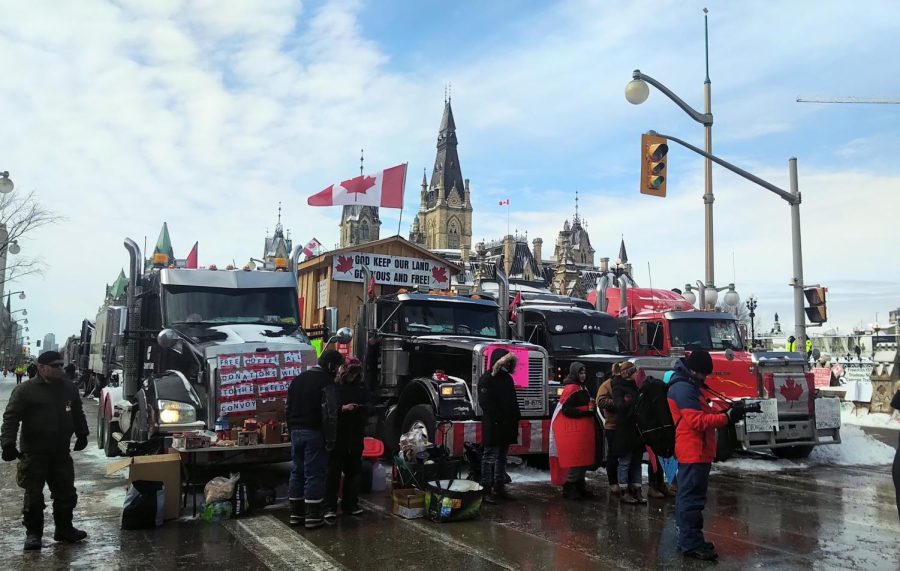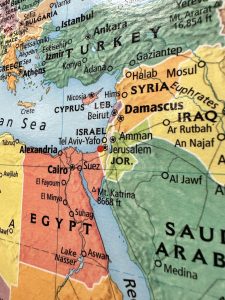A Timeline of the Freedom Convoy
February 11, 2022
On Saturday, in the wake of protests in Canada that began Jan. 28, Ottawa’s police chief declared a “siege.” Now, the city is officially in a state of emergency. We’ll take a look at where the conflict started, how it’s progressed and what could happen as the scene continues to unfold.
Nov. 19
The Public Health Agency of Canada releases an update regarding border crossings. It states that Canadian citizens, permanent residents and people that are fully vaccinated and can prove they’ve been out of the country for fewer than 72 hours may enter the country without medical testing under the Indian Act. Individuals with reasons that make them unfit for vaccination who are also accompanying minors under 12 are also permitted.
Additionally, the update includes that previously exempted travelers are required to be fully vaccinated to enter. Those visiting family, students, athletes, individuals with work permits and essential workers will have to comply with the new guidelines.
Jan. 13
The Canadian Ministers of Health, Transport and Public Safety release a collective statement reiterating the requirements established by November’s message:
“On November 19, 2021, we announced certain categories of travelers will only be allowed to enter the country if they are fully vaccinated for entry into Canada … These groups include several essential service providers, including truck drivers. Let us be clear: This has not changed. As of January 15, 2022, unvaccinated or partially vaccinated foreign national truck drivers, coming to Canada from the US by land, will be directed back to the United States.”
Jan. 15
The mandate officially goes into action, as do Canadian citizens. Tamara Lich, an original member of the Maverick Party’s governing council, creates a now- removed GoFundMe fundraiser to finance truckers’ lodging, fuel and food expenses during border processing. In less than a month, the site would manage to raise over $7.9 million.
Jan. 22
Alberta’s premier Jason Kenney releases a statement on his Twitter account, which has over 280k followers.
“Ottawa’s trucker vaccine mandate has to go,” Kenney said. “We can’t afford to lose thousands of truckers.”
By now, the Canadian Traffic Alliance has estimated 20% 0f truckers have been affected by the mandate, contributing to an ongoing shortage.
Jan. 23
Fewer than two weeks after the mandate went into effect, a convoy of truckers begins making their way to Ottawa from Vancouver. USN now estimates that the protesters will reach the country’s capital by Jan. 29.
Jan. 29 Reports come in that thousands of truckers have begun to enter Ottawa. Protesters chant, “freedom” as they rally in the streets, advocating against not just vaccines, but vaccinations specifically required for them to work.
Feb. 6
As more and more people begin to flood into Ottawa, the goals become less unified, some protest against vaccine mandates, others lockdowns and even the Prime Minister. With the swell in numbers also comes a wave of law enforcement.
Seven people are arrested with counts varying from mischief to driving while prohibited, vehicles are seized and over 100 traffic notices are issued. The mayor of Ottawa officially declares a state of emergency.
Feb. 8
The Ambassador Bridge, a major thoroughfare for U.S. and Canadian trade, comes to a standstill as people protest. Estimated to facilitate $1.7 billion in trade between the two countries each day, only those wishing to exit Canada are able to enter the U.S., even then at a slow pace.
At 9:15 p.m. the Michigan Department of Transportation announces on Twitter that the Detroit bridge to Canada is closed. Additionally, the Royal Canadian Mounted Police states that the crossing between Montana and Alberta is blocked by protesters.
Feb. 10
General Motors, Ford and Toyota announce Wednesday and Thursday that the Ambassador Bridge protests have taken a toll on manufacturing.
While GM has tried to workaround the issue by chartering planes, Lansing Delta Township Assembly plant employees were notified their second shifts were cancelled due to the protests.
One by one, Toyota, Jeep and Ford release statements stating the impacts of the protests, with the latter noting the “reduced capacity” in their Oakville and Windsor plants.
What Next?
While the situation in Canada continues to evolve, a study by McMaster University and Vox Pop Labs has found that the majority of Ottawa residents disagree with protesters.
Despite their numbers and support seemingly diminishing though, protesters still hold that they’ll go on for “as long as it takes.” But the threat of violence still remains, with the Ottawa police chief even calling the remaining truckers a, “highly volatile group of unlawful individuals.”
As trade and traffic still stagnates at major border crossings, the world anxiously holds its breath and looks on.








